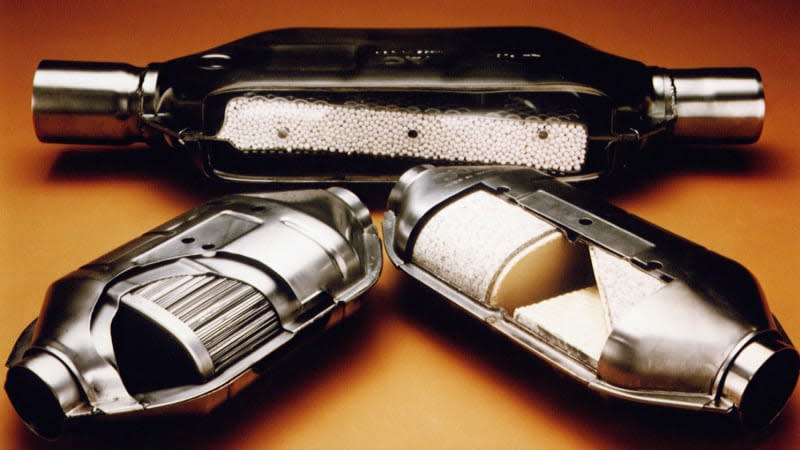What is a car's catalytic converter? And how can you protect against thieves?

There are periods when catalytic converters are part of frequent news stories, and the reason isn't a fun one. From time to time, we'll see an uptick in converter thefts, which makes for clicky headlines, but leaves vehicle owners with expensive repair bills and a sense of anger and vulnerability. Thankfully, the rate of theft has gone down as of late, but as many as 153,000 catalytic converters were stolen in 2022 alone, and it could always spike again. But what is a catalytic converter, how does it work and how can you prevent one from being stolen?
What is a catalytic converter?
A catalytic converter is a component of an internal combustion vehicle's exhaust system. In most cases, it looks like a flattened muffler that resides about halfway down the exhaust pipes. Inside are precious metals such as platinum, rhodium and palladium that are used in chemical reactions to transform emissions into less destructive compounds. Early catalytic converters combined oxygen, carbon monoxide and unburned hydrocarbons to produce less harmful CO2 and water vapor. Later developments also reduced nitrogen oxides.
Do all cars have a catalytic converter?
If your car isn't a classic and is powered by a gasoline engine, the answer is very likely yes. In 1975, the government mandated catalytic converters for almost all passenger vehicles in an effort to reduce air pollution. Combined with other abatement programs, air quality greatly improved over the following years. A side benefit was the elimination of lead additives in fuel since those compounds were incompatible with catalytic converters.
Why do people steal catalytic converters?
Converters end up in the news because of those precious metals inside. There are typically three to seven grams of platinum in a converter, along with up to seven grams of palladium and two grams of rhodium. In May 2024, prices for those metals cost as much as $36 per gram of platinum, $35 for palladium and a whopping $164 for rhodium. To put that into perspective, gold cost $75 per gram.
With this knowledge, thieves have been targeting catalytic converters and have gotten very accomplished at swiping them in an instant. In less than a minute, they can pull the converter loose from the exhaust with a cordless reciprocating saw and disappear into the night. For the trouble, those thieves can net between $50 and $300 from a recycler. If it's from a hybrid vehicle, which requires more of those metals, they can return as much as $1,500.

 Yahoo Autos
Yahoo Autos 